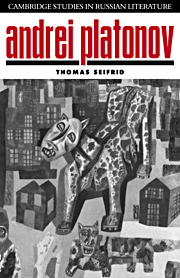Book contents
- Frontmatter
- Contents
- Preface
- List of abbreviations
- Introduction: The problem of reading Platonov
- 1 Consciousness and matter: Platonov in Voronezh and Tambov (1917–1926)
- 2 Learning the language of being (1926–1927)
- 3 Chevengur and the utopian genre
- 4 Platonov and the culture of the Five-Year Plan (1929–1931)
- 5 “Socialist Realist” Platonov (1934–1951)
- Conclusion
- Notes
- Select bibliography
- Index
- CAMBRIDGE STUDIES IN RUSSIAN LITERATURE
1 - Consciousness and matter: Platonov in Voronezh and Tambov (1917–1926)
Published online by Cambridge University Press: 27 August 2009
- Frontmatter
- Contents
- Preface
- List of abbreviations
- Introduction: The problem of reading Platonov
- 1 Consciousness and matter: Platonov in Voronezh and Tambov (1917–1926)
- 2 Learning the language of being (1926–1927)
- 3 Chevengur and the utopian genre
- 4 Platonov and the culture of the Five-Year Plan (1929–1931)
- 5 “Socialist Realist” Platonov (1934–1951)
- Conclusion
- Notes
- Select bibliography
- Index
- CAMBRIDGE STUDIES IN RUSSIAN LITERATURE
Summary
The earliest years of Platonov's career (1917–1926) encompass his emergence as a provincial writer of conspicuous, if also idiosyncratic, talent, a “rare, self-made figure” (“redkii samorodok”), as the audience declared him following one of several “literary evenings” devoted to his poetry in the Voronezh club of the Komsozhur (Inozemtseva, 92). The stream of newspaper articles and essays he produced in these years belongs to the general cultural ferment of the period immediately following the October Revolution. As a result many of the pieces are naively conceived and awkwardly written, and consist mainly of attempts at mixing the Proletkul't slogans popular at the time with his own, often quite eccentric views on the changes taking place within Russian society. They are essential, however, to our understanding of the Platonov who wrote Chevengur, Kotlovan, and “Dzhan,” because for all their naive profusion they establish the paradigm of philosophical themes with which his later stories and novels preoccupy themselves. They furthermore reveal habits of thought and expression in which one can recognize the emerging contours of Platonov's literary imagination, providing a portrait in statunascendi of both his world view and the poetic means through which it was expressed.
The bulk of Platonov's journalism suggests that in this period he saw himself primarily as a disseminator of Bogdanov's philosophy and the tenets of the Proletkul't: the titles of the articles already reflect this stance (for example, “Kul'tura proletariata,” “Proletarskaia poeziia,” “K nachinaiushchim proletarskim poetam i pisateliam,” “Normalizovannyi rabotnik”), as does his penchant for signing the articles as “rabochii A. Platonov.”
- Type
- Chapter
- Information
- Andrei PlatonovUncertainties of Spirit, pp. 32 - 55Publisher: Cambridge University PressPrint publication year: 1992

